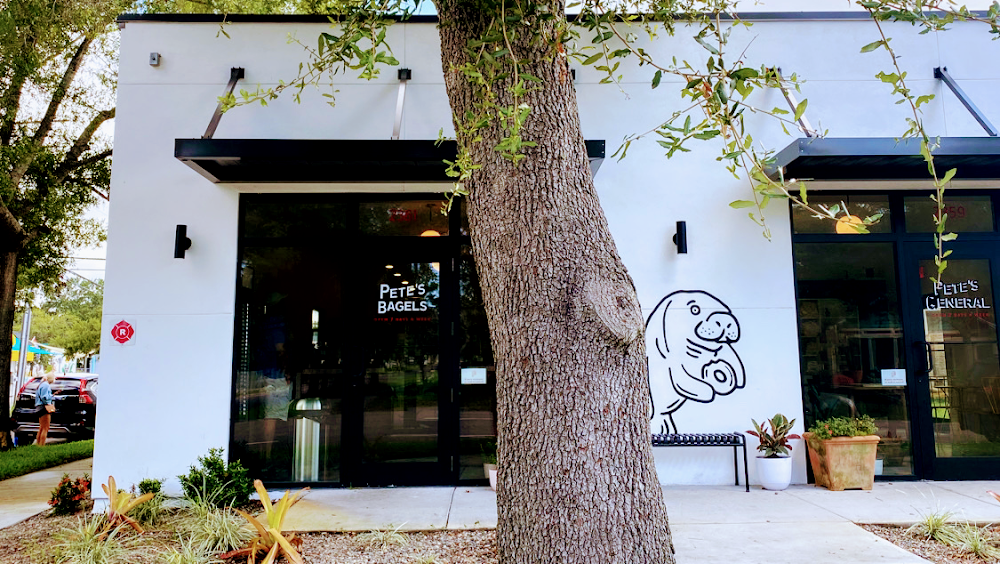
Pete’s Bagels Bets on the People: A St. Pete Experiment in Community Capital
Share
A Different Kind of Investment Story
When national chains keep swallowing up neighborhoods, one St. Pete favorite is rewriting the rules of small business growth. Pete’s Bagels, the family-run shop that’s become a morning staple across the city, is giving locals a chance to invest directly in its future while earning real returns.
The company recently launched a public campaign on SMBX, a marketplace designed for small businesses to raise capital through what it calls Small Business Bonds. The offer allows anyone with a bank account to invest in Pete’s Bagels and receive an eleven percent return over time. The team has forty-two days to raise 1.24million dollars and, as of this week, has already brought in more than $23,000+.
The money will go toward opening three to five new Tampa Bay locations, expanding the company’s Gulfport commercial kitchen, and growing its catering and wholesale programs. It is a model that keeps ownership local while offering residents the chance to literally buy into the success of a brand that already feels like part of the community.
Why Staying Independent Matters

For owner Steven Peterman, independence is not a slogan. It is the foundation of Pete’s identity.
“I feel like it’s really important for Pete’s to keep our family-owned and operated vibe,” Peterman said. “I wanted to find a way to compete locally and still maintain our independence.”
Since opening in 2019, Pete’s Bagels has grown into four locations across Tampa Bay, including the flagship in St. Petersburg’s Grand Central District, Seymour’s Café downtown, a drive-thru in Harbordale, and a shop in Ybor City. Together, the stores generate more than three million dollars in annual revenue. But despite the success, Peterman says independent operators like him face constant challenges finding affordable ways to raise capital.
That problem has only grown as three new bagel franchises, all backed by private equity, have opened or announced plans for Tampa expansion. Competing against that level of financial backing can easily push smaller, local brands out of the picture.
Expanding with the Community
Every Pete’s location currently relies on the same kitchen in Gulfport. The plan now is to move into a new 4,600-square-foot space that will allow the company to dramatically increase production and meet growing demand for wholesale, catering, and in-store service.

According to Peterman, the majority of the funds will go directly toward expansion, staffing, and operations. A smaller portion will be used to refinance short-term debt, and SMBX will take a four percent service fee for managing the offering.
Investments start at just ten dollars, making it accessible for nearly anyone who wants to participate. One SMBX user from Nevada invested five thousand dollars, proof that the excitement around Pete’s Bagels extends well beyond Pinellas County.
A Transparent New Model
Unlike traditional crowdfunding, the SMBX model requires small businesses to file with the U.S. Securities and Exchange Commission and complete a financial audit before being approved. Peterman described the process as easy to navigate and said it gave him confidence that investors could trust what they were buying into.
“It kind of evens the playing field,” he explained. “It’s a win-win situation for everybody involved.”
The SMBX platform focuses on helping mom-and-pop businesses like Pete’s connect with investors who believe in local ownership. Once a company raises more than one hundred twenty-five thousand dollars, an independent auditor is required to conduct a second review to ensure accountability.
Betting on St. Pete
If Pete’s Bagels reaches its goal, the expansion could double or even triple its presence across Tampa Bay without giving up control to outside investors. It is a rare example of growth that keeps profits, pride, and ownership close to home.
While developers continue to flood downtown with condos and private equity firms buy up independent brands, Pete’s Bagels is proving that local business can still thrive when the community has a real stake in its success.
Would you invest in your favorite neighborhood spot if you could? Share your thoughts below. This might be the start of a new kind of local economy, powered not by big money, but by people who care about where they live.

